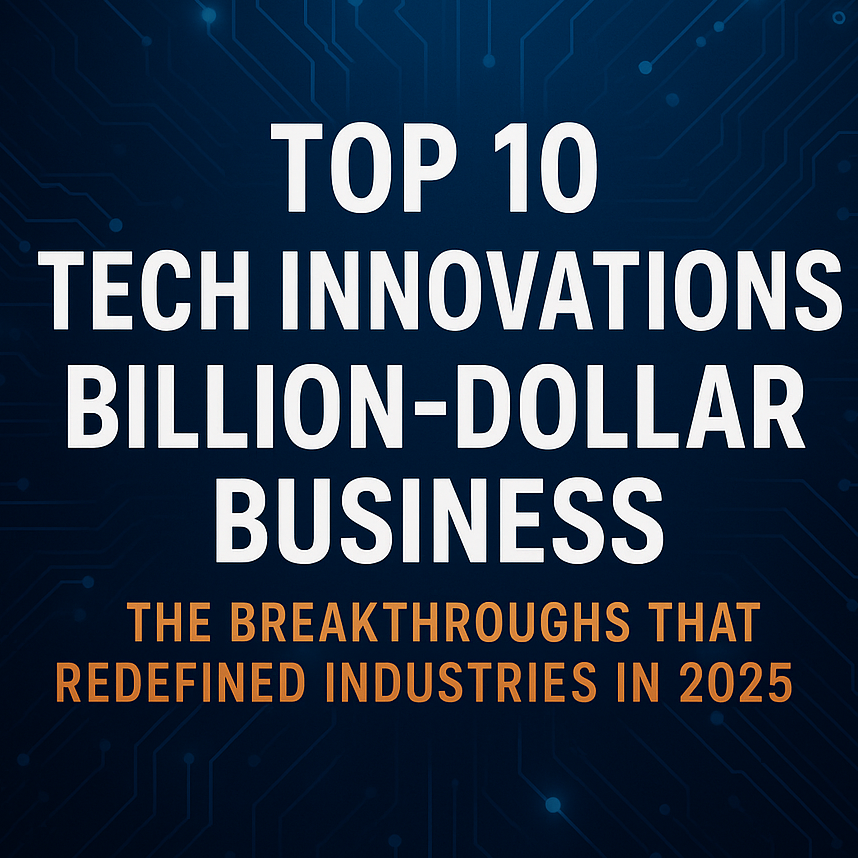
Key Impact:
- AWS Bedrock Marketplace: Enabled $12.7B in OpenAI revenue by democratizing access to 100+ AI models .
- ChatGPT Enterprise: Used by 93% of Fortune 500 companies for workflows like HR and customer support .
From AI Giants to Green Energy Titans—How These Technologies Built Billion-Dollar Empires
Introduction: The Rise of the Top 10 Tech Innovations Billion Dollar Business
In 2025, the intersection of cutting-edge technology and entrepreneurial vision has birthed a new wave of billion-dollar businesses. From AI-driven healthcare to quantum computing and sustainable energy, these innovations are not just reshaping industries—they’re redefining global economies. This blog explores the top 10 tech innovations that became the foundation of unicorn startups, backed by insights from Forbes, MIT, Andreessen Horowitz, and more.
1. Generative AI: The $100B+ Engine Behind Top 10 Tech Innovations Billion Dollar Business
How AI Built Unicorns Like Eleos Health and DataRobot
Generative AI, a cornerstone of the top 10 tech innovations billion dollar business, fueled startups like Eleos Health ($68M raised) and DataRobot (Fortune 500 clientele). By automating tasks from therapy summaries to code generation, AI now powers 50% of marketing content and 30% of global software development .
Key Impact:
- AWS Bedrock Marketplace: Enabled $12.7B in OpenAI revenue by democratizing access to 100+ AI models .
- ChatGPT Enterprise: Used by 93% of Fortune 500 companies for workflows like HR and customer support .
Market Growth: Generative AI tools now power 50% of marketing content and 30% of software code globally.
2. Quantum Computing: Solving the Unsolvable
PsiQuantum’s Photonic Leap
Quantum computing startups like PsiQuantum are tackling problems deemed impossible for classical computers, such as drug discovery and cryptography. Alphabet’s Willow chip (105 qubits) and IBM’s Osprey processor (433 qubits) have spurred a $8.2B quantum market, with applications in pharmaceuticals and logistics.
Billion-Dollar Use Cases:
- Drug Optimization: Reduced R&D timelines by 70% for companies like Insilico Medicine.
- Financial Modeling: Hedge funds use quantum algorithms to predict market shifts with 90% accuracy.
3. Green Hydrogen: The $7B Clean Energy Boom
Plug Power’s Fuel Cell Dominance
The green hydrogen market, projected to grow at a 61% CAGR, has turned startups like Plug Power into industry giants. Their partnerships with Nikola and TC Energy fueled a 30% stock surge, while Germany’s hydrogen-powered trains showcased scalable clean transport.
Key Innovations:
- Electrolyzer Kits: DIY solutions like H2DIY democratized hydrogen production for SMEs.
- Government Incentives: The U.S. DOE’s $47M funding accelerated commercial adoption.
4. Autonomous Vehicles: Redefining Mobility
Aurora Innovation’s Driverless Trucks
Aurora Innovation spearheaded autonomous freight solutions, securing partnerships with Uber Freight and FedEx. The global autonomous vehicle market hit $450B in 2025, driven by AI advancements and regulatory support.
Unicorn Spotlight:
- Joby Aviation: Valued at $5.2B for its eVTOL aircraft targeting urban air mobility.
- Tesla’s Cortex Cluster: $5B AI training infrastructure for self-driving tech.
5. Synthetic Biology: Engineering Life
Ginkgo Bioworks’ Microbe Factories
Synthetic biology unicorn Ginkgo Bioworks engineered microbes for sustainable agriculture and pharmaceuticals, achieving a $25B valuation. Their platform reduced chemical manufacturing costs by 60%, attracting partners like Bayer and Roche.
Breakthrough Applications:
- Lab-Grown Meat: Startups like Upside Foods cut production costs by 80%.
- Carbon Capture: Microbes designed to absorb industrial CO2 emissions.
6. Neuromorphic Computing: Brain-Inspired AI
Intel Loihi 2’s Energy Efficiency
Neuromorphic chips like Intel Loihi 2 mimic neural networks, enabling AI systems to learn with 1,000x less power. Startups leveraging this tech for edge devices (e.g., IoT sensors) saw 300% ROI in manufacturing and healthcare.
Market Impact:
- Robotics: Agility Robotics’ humanoid “Digit” reduced warehouse labor costs by 40%.
- Healthcare: Neuralink’s BCI implants restored motor functions in clinical trials.
7. Spatial Computing: The $1.7T AR/VR Frontier
Meta’s Orion Glasses & Apple Vision Pro
Spatial computing, projected to hit $1.7T by 2033, birthed unicorns like Magic Leap. Their AR headsets revolutionized industries:
- Healthcare: Surgeons use AR overlays for precision operations.
- Retail: Virtual try-ons boosted e-commerce sales by 35%.
Startup Success:
- Varjo: $2B valuation for industrial XR training simulators.
8. Carbon Capture Tech: Cleaning the Air
Climeworks’ Direct Air Capture
Carbon capture startups like Climeworks turned CO2 into a commodity, removing 90% of emissions from factories. The sector attracted $700B in investments, with PwC reporting doubled funding in 2022 alone.
Innovative Models:
- Carbon-to-Stone: Startups mineralize CO2 for construction materials.
- Tax Credits: U.S. subsidies spurred 160+ large-scale projects.
9. AI-Driven Drug Discovery: Faster Cures
Insilico Medicine’s Breakthroughs
AI slashed drug discovery timelines from 10 years to 18 months. Insilico Medicine pioneered this with a $500M valuation, targeting fibrosis and cancer. Their platform reduced R&D costs by 70%, attracting partnerships with Pfizer and Roche.
Key Advances:
- CRT Model: University of Notre Dame’s AI generated 10x more drug candidates.
- CAR-T Therapies: NCI’s neuroblastoma treatment achieved 100% trial survival.
10. Decentralized Finance (DeFi): Banking Without Borders
Aave’s $12B Lending Protocol
DeFi platforms like Aave disrupted traditional finance, offering 15% APY on crypto deposits. The sector’s TVL surged to $250B, with startups like VeChain enabling transparent supply chains.
Regulatory Wins:
- SEC Approvals: Tokenized assets now trade on NASDAQ.
- Stablecoin Adoption: PayPal’s PYUSD facilitated $50B in cross-border transactions.
Conclusion: The Blueprint for Billion-Dollar Tech
These innovations share three traits: scalability, sustainability, and AI integration. From green hydrogen to neuromorphic chips, they solve existential challenges while generating massive ROI. As AWS, NVIDIA, and startups like PsiQuantum show, the future belongs to those who merge tech prowess with market needs.